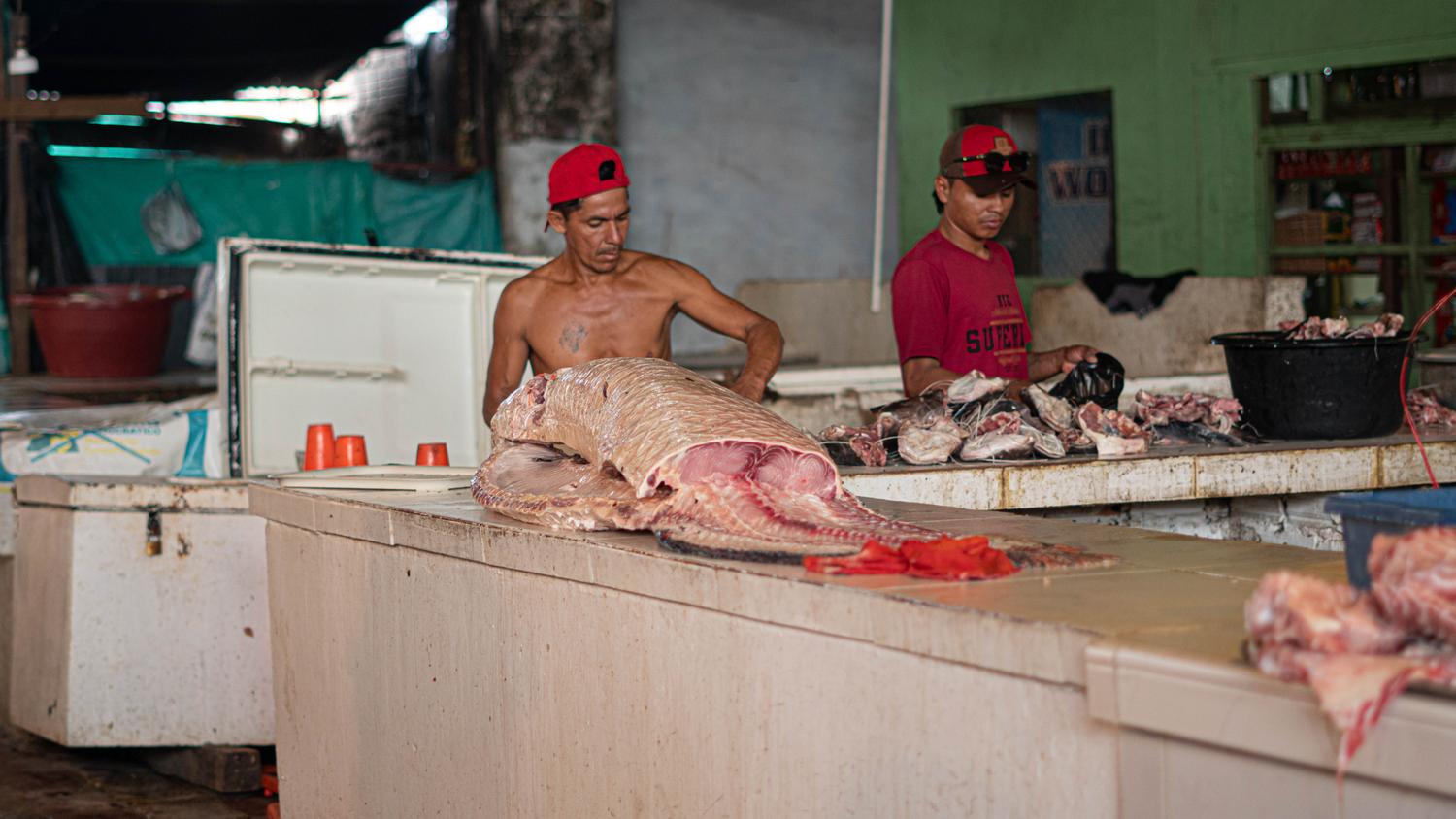AT THE BORDER, FISHERMEN LIVE IN PRECARITY AND WITHOUT REGULATIONS
For the “Bruno and Dom project,” Rodrigo Pedroso, a journalist at Peruvian media Ojo Público, traveled along the Javari River through Brazil, Peru and Colombia, on the trail of the pirarucu.

In Atalaia do Norte, Brazil, he met Raimundo Pinheiro, a 51-year-old fisherman who has spent his whole life chasing these mammoth fish.
“We were seven children, my father raised us alone. I can’t read; I only learned to fish,” he said. “There are about 600 of us here who live only from fishing—all from the region. We used to work with the natives. We were partners, then the demarcation happened and we had to leave. The area shrank.”
Pinheiro said that he fishes higher along the Javari River, upstream of the protected area on “a little piece that belongs to us.” But he doubted that the invasions of indigenous territories would stop.
“There are no more fish here. The situation is growing more and more difficult. The [authorized] fishing zone is already small, and they want to decrease it more,” he said. “How are we going to live?”
According to Pinheiro’s calculations, a kilo of pirarucu is sold for 10 reals (€1.80). Each expedition requires about 835 reals (€150) for gas, salt, ice and oil. Fishermen also need what’s called a “ranch,” a fishing platform installed on the river, which costs a few thousand reals (several hundred euros). Each operation needs two to five people to fish.
In Islandia, on the Peruvian side of the Javari River, the struggles are the same. Juan*, who sold his harvest at 7 soles (€1.70) per kilo, fished in Brazil, on the other side of the border, spending three to 15 days each trip. Illegally.
“If I had a legal option, I would take it,” he said. “But I did not go to school. I’ve worked since I was a kid. I have three children.”
Almério Alves Wadick, an indigenous person in Atalaia do Norte, understood their difficulties.
“The lakes outside of indigenous lands are overrun, so fishermen end up inside,” he said.
All of the people interviewed said that the places where fishing is authorized are overexploited and no longer yield fish, pushing fishermen to illegally enter demarcated zones.
This phenomenon is more widespread because the border zone is porous, and fishermen move from one country to another, selling their catch on one side or another of the Javari River. Fresh pirarucu fished in Brazil goes to Colombia, while the salted pirarucu ends up in Peru. Although Peru and Colombia also have specific rules for pirarucu fishing, these are less strict than those of Brazil.
“There is a license to transport fish from one country to another, but it is limited,” Mario Jimenez, Peruvian mayor of Islandia and a former fisherman, said. “There are border checks, but of course, there is fish smuggling, like everywhere.”
On the Brazilian side, Ibama has handed out “47 fines for fishing, transporting or selling pirarucu in five municipalities in the Vale do Javari region since 1998, mostly in Tabatinga.”
This amounts to about two per year of the total “230 infractions connected to illegal fishing,” according to data from Pública published in September 2022 by the federal university of Minas Gerais.
In Peru and Colombia, the employees of the local regulatory authorities interviewed by the consortium described the complicated nature of border checks, seeing as the fish’s origin relies on the fishermen’s declaration. Many also denounced the lack of resources, where salaries were often paid months late, employees worked in dilapidated conditions, and sometimes did not even have access to fuel or a boat.
“There is not much control over purchases and sales,” Santiago Duque, a professor at the Colombian Amazon Research Institute, said. “In Colombia today, the origin of fish is established based on good faith. Some fishermen sell their fish to others, directly on the river, and they then come to sell it here…So we don’t know the origin of the fish.”
These porous conditions transform fish caught illegally on Brazilian indigenous lands into legal fish. Their origins appear as whatever the fishermen declare to authorities. The situation is further complicated by the exchange of fish on the river itself. Pirarucu from the Javari Valley could be served in restaurants in Lima or Bogotá, but to the consumer the illegal origins would never be known.